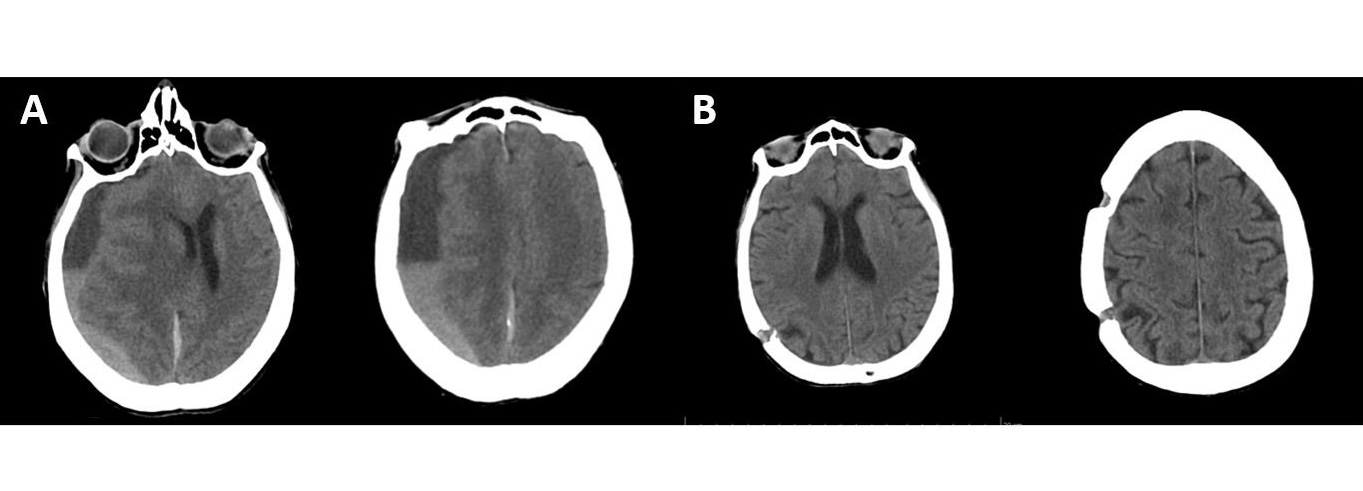Category: Myoclonus
Objective: .
Background: Introduction:
Opsoclonus myoclonus syndrome is characterized by myoclonic jerks and ocular opsoclonus (spontaneous, arrhythmic, and conjugate ocular saccades that occur in all directions of gaze without saccadic interval). The involuntary movements can be diffuse or focal and can be accompanied by cerebellar symptoms. (1)
Among the causes, the most classical etiology is paraneoplastic. Small cell lung cancer is the leading cause in adults and neuroblastoma in children. (2) Other causes reported in the literature include infectious, inflammatory, demyelinating, hemorrhagic, and autoimmune. (3)
Method: .
Results: Case report:
A 78-year-old female patient, with a past diagnosis of Chronic Myeloid Leukemia in chronic phase, in use of hydroxyurea and Imatimib, was hospitalized due to medullary toxicity syndrome and pancytopenia. During hospitalization, the patient presented an episode of a generalized tonic-clonic seizure.
After the event, generalized myoclonus, opsoclonus, and persistent cerebellar ataxia were observed, with no triggering or improvement factors. Investigation for metabolic and infectious causes were negative and a brain CT revealed a subdural hematoma at the right [figure 1].
The patient was treated surgically with hematoma aspiration and decompression, and the procedure was uneventful. After the procedure the patient progressed with a complete resolution of the movements, being discharged from the hospital for a follow-up of the hematological disease . The patient persisted free of opsoclonus or myoclonus until the last follow-up in December of 2021.
Conclusion: Conclusion:
We describe a case of opsoclonus myoclonus syndrome secondary to an acute subdural hematoma. This is a rarely reported cause. Despite the presence of other potential etiologies in this patient, the marked and sustained recovery after surgical treatment strongly suggests a causal relationship.
References: 1- Klaas JP, Ahlskog JE, Pittock SJ, Matsumoto JY, Aksamit AJ, Bartleson JD, Kumar R, McEvoy KF, McKeon A. Adult-onset opsoclonus-myoclonus syndrome. Arch Neurol. 2012 Dec;69(12):1598-607. doi: 10.1001/archneurol.2012.1173. PMID: 22986354.
2- Rossor T, Yeh EA, Khakoo Y, Angelini P, Hemingway C, Irani SR, Schleiermacher G, Santosh P, Lotze T, Dale RC, Deiva K, Hero B, Klein A, de Alarcon P, Gorman MP, Mitchell WG, Lim M; OMS Study Group. Diagnosis and Management of Opsoclonus-Myoclonus-Ataxia Syndrome in Children: An International Perspective. Neurol Neuroimmunol Neuroinflamm. 2022 Mar 8;9(3):e1153. doi: 10.1212/NXI.0000000000001153. PMID: 35260471; PMCID: PMC8906188.
3- Sahu JK, Prasad K. The opsoclonus–myoclonus syndrome. Pract Neurol. 2011 Jun;11(3):160-6. doi: 10.1136/practneurol-2011-000017. PMID: 21551110.
To cite this abstract in AMA style:
V. Arca, F. Cavalcante, M. Saraiva, M. Bezerra. Opsoclonus Myoclonus Syndrome due to subdural hematoma: an uncommon etiology [abstract]. Mov Disord. 2023; 38 (suppl 1). https://www.mdsabstracts.org/abstract/opsoclonus-myoclonus-syndrome-due-to-subdural-hematoma-an-uncommon-etiology/. Accessed April 2, 2025.« Back to 2023 International Congress
MDS Abstracts - https://www.mdsabstracts.org/abstract/opsoclonus-myoclonus-syndrome-due-to-subdural-hematoma-an-uncommon-etiology/

